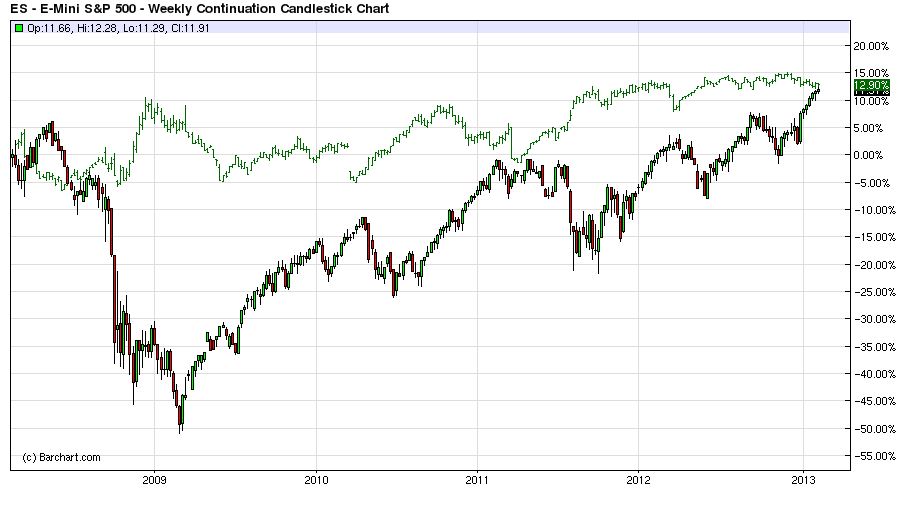I was visiting a large oil trading floor last year, and they were having their big state of the union town hall on the floor and the CEO of the group that trading and marketing rolled up into talked about the dying volatility in general saying that they could hold on for a couple more years with this level of volatility, but if this continued for 5 or 6 years they were in trouble, and would have to find new ways of making money, i.e., new business models for trading and marketing.
Industry Layoffs
Last week ING and SOCGEN both announced significant layoffs despite the rest of the economy seeing a slight improvement over the last 12 months. CITI has already restructured, and promised more layoffs in the future, and J.P. Morgan announced substantial job cuts in their equities division on Friday.
Dead Markets
Just watch markets lately and one realizes rather fast that more job cuts are on the way, and in a major way all across the spectrum from financial analysts, stock analysts, traders in most products, back office support staff, and management.
More Layoffs Inevitable
I would say that all firms probably need to cut staff by at least 1/3 over the next two years, with current and trending market dynamics in the industry over the last five years, these positions are just not needed today. Frankly, these jobs are dead weight on firms’ balance sheets, and it is amazing how long it has taken firms to reduce staff given the evolution in financial markets.
Changing Market Dynamics
First of all be sorry for what you wish for in fed induced liquidity taking all the volatility out of markets; and trading profits are sure to decline in trading shops all along the spectrum of products.
Next, with the evolution of computer trading and computer driven Algos not only has this reduced volatility, but traders’ jobs in the process.
Third, with highly correlated markets and more money flowing into ETFs, stock and commodity differentiation is less relevant than in the past requiring fewer analysts.
Fourth, with major consolidation in the industry due to the collapse of Bear Stearns, Lehman Brothers and Merrill Lynch this has reduced the overall size of market competition, shrinking volatility further, and reducing overall trading volume.
Fifthly, the overall sluggishness of the global economy where many countries have debt problems and are still in the deleveraging phase has severally shrunken GDP growth which hampers private capital infusion into businesses which hurt the IPO and investment banking markets for the financial industry.
And finally as the chart of the 10-year note versus the S&P 500 futures contract illustrates asset class differentiation over the last five years has reduced significantly requiring less investment expertise than in the past. All of which is bad for jobs in an industry struggling to redefine itself after the financial crisis.
Revive Markets=More Industry Jobs
In watching financial markets there are many products which are simply deteriorating before my eyes from a volume, volatility and profitability standpoint, and the more of these markets that pop up each year means that many more job cuts in the industry are on the horizon.
- English (UK)
- English (India)
- English (Canada)
- English (Australia)
- English (South Africa)
- English (Philippines)
- English (Nigeria)
- Deutsch
- Español (España)
- Español (México)
- Français
- Italiano
- Nederlands
- Português (Portugal)
- Polski
- Português (Brasil)
- Русский
- Türkçe
- العربية
- Ελληνικά
- Svenska
- Suomi
- עברית
- 日本語
- 한국어
- 简体中文
- 繁體中文
- Bahasa Indonesia
- Bahasa Melayu
- ไทย
- Tiếng Việt
- हिंदी
More Layoffs Coming In Financial Markets
Published 02/17/2013, 12:40 AM
Updated 07/09/2023, 06:31 AM
More Layoffs Coming In Financial Markets
Trading: State of the Union
Latest comments
Loading next article…
Install Our App
Risk Disclosure: Trading in financial instruments and/or cryptocurrencies involves high risks including the risk of losing some, or all, of your investment amount, and may not be suitable for all investors. Prices of cryptocurrencies are extremely volatile and may be affected by external factors such as financial, regulatory or political events. Trading on margin increases the financial risks.
Before deciding to trade in financial instrument or cryptocurrencies you should be fully informed of the risks and costs associated with trading the financial markets, carefully consider your investment objectives, level of experience, and risk appetite, and seek professional advice where needed.
Fusion Media would like to remind you that the data contained in this website is not necessarily real-time nor accurate. The data and prices on the website are not necessarily provided by any market or exchange, but may be provided by market makers, and so prices may not be accurate and may differ from the actual price at any given market, meaning prices are indicative and not appropriate for trading purposes. Fusion Media and any provider of the data contained in this website will not accept liability for any loss or damage as a result of your trading, or your reliance on the information contained within this website.
It is prohibited to use, store, reproduce, display, modify, transmit or distribute the data contained in this website without the explicit prior written permission of Fusion Media and/or the data provider. All intellectual property rights are reserved by the providers and/or the exchange providing the data contained in this website.
Fusion Media may be compensated by the advertisers that appear on the website, based on your interaction with the advertisements or advertisers.
Before deciding to trade in financial instrument or cryptocurrencies you should be fully informed of the risks and costs associated with trading the financial markets, carefully consider your investment objectives, level of experience, and risk appetite, and seek professional advice where needed.
Fusion Media would like to remind you that the data contained in this website is not necessarily real-time nor accurate. The data and prices on the website are not necessarily provided by any market or exchange, but may be provided by market makers, and so prices may not be accurate and may differ from the actual price at any given market, meaning prices are indicative and not appropriate for trading purposes. Fusion Media and any provider of the data contained in this website will not accept liability for any loss or damage as a result of your trading, or your reliance on the information contained within this website.
It is prohibited to use, store, reproduce, display, modify, transmit or distribute the data contained in this website without the explicit prior written permission of Fusion Media and/or the data provider. All intellectual property rights are reserved by the providers and/or the exchange providing the data contained in this website.
Fusion Media may be compensated by the advertisers that appear on the website, based on your interaction with the advertisements or advertisers.
© 2007-2024 - Fusion Media Limited. All Rights Reserved.
